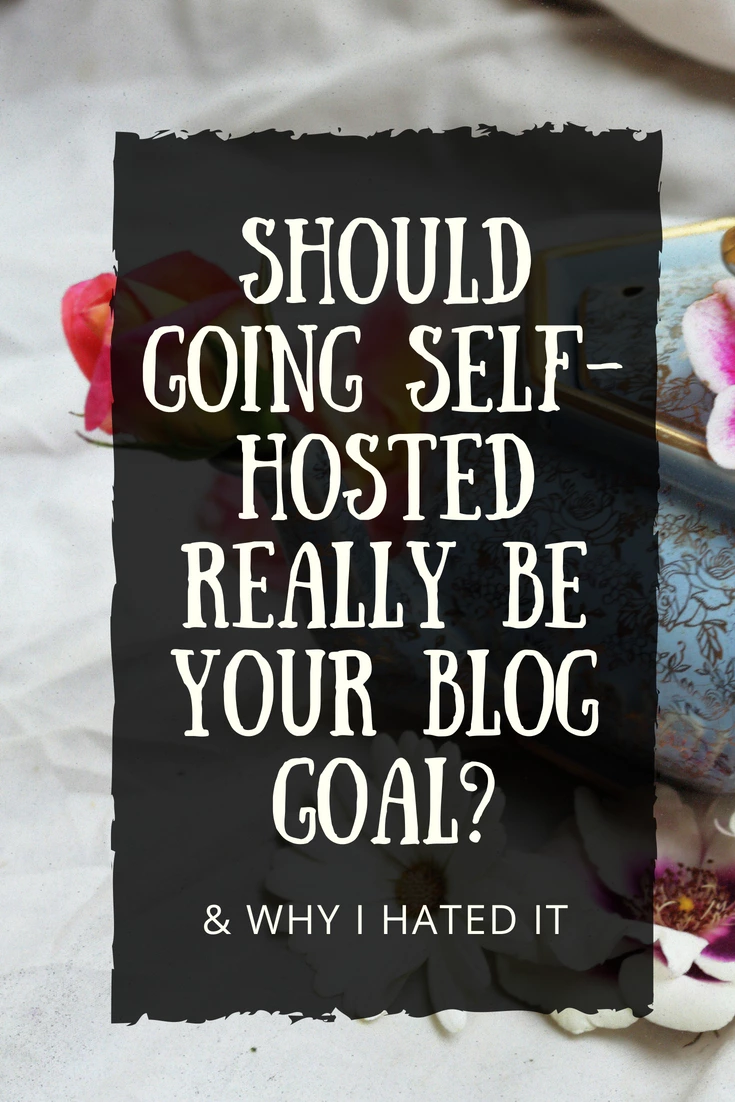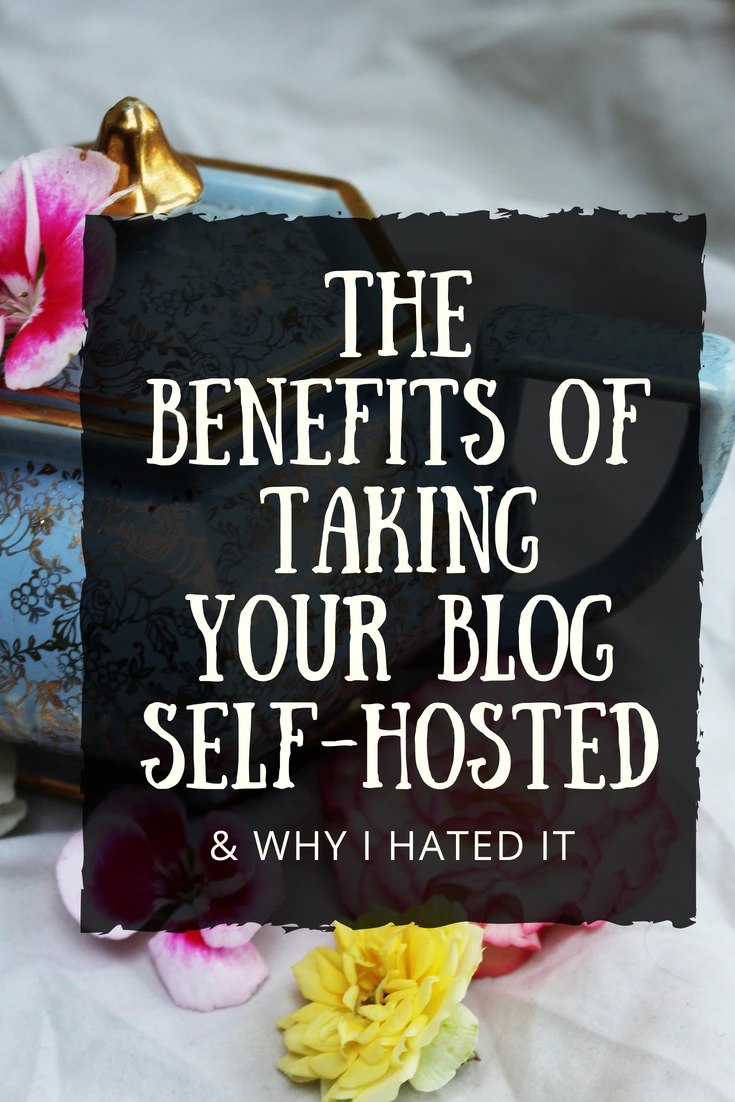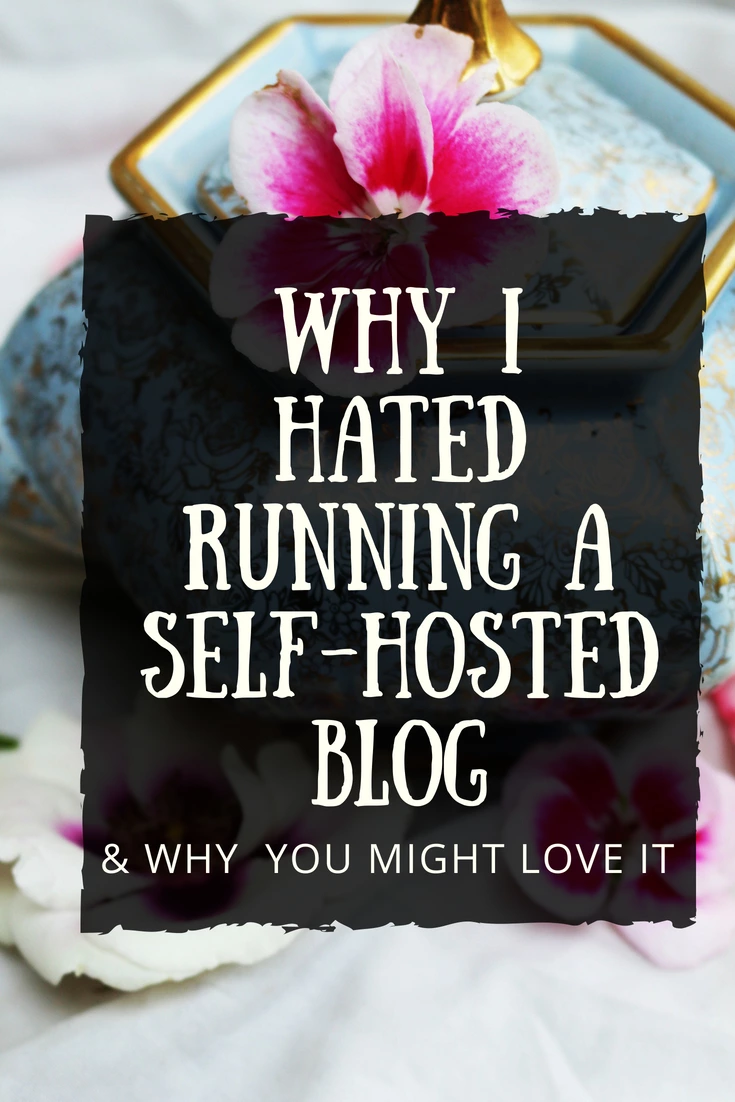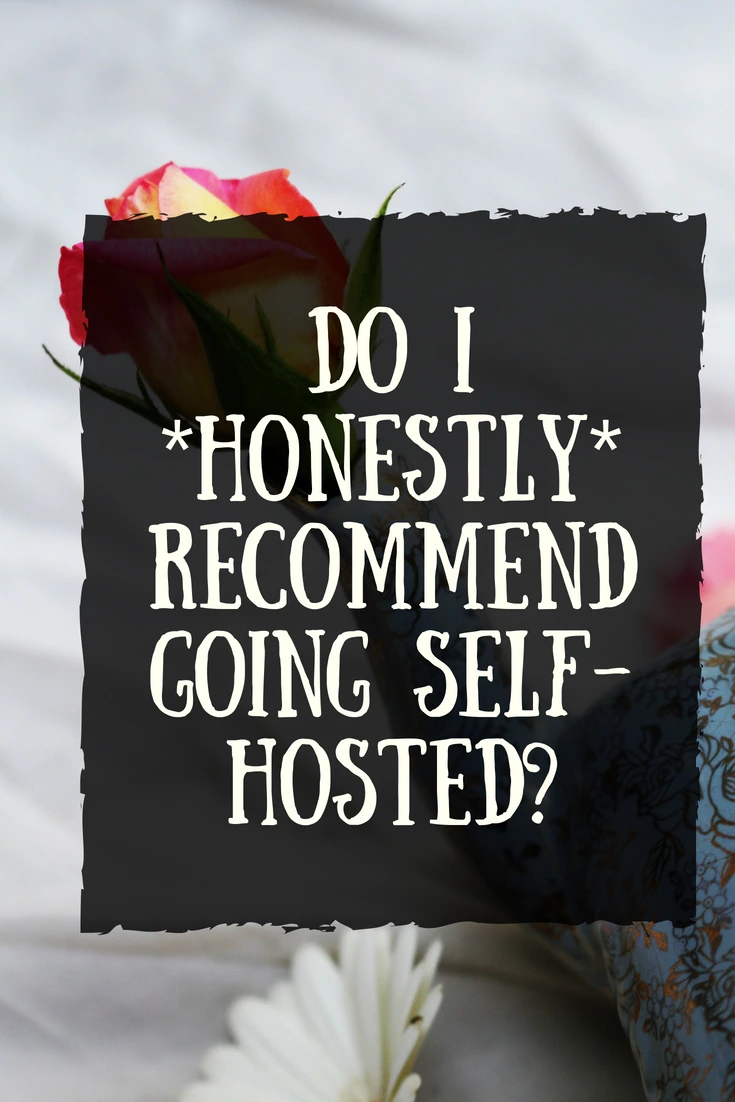Going Self-Hosted – Maybe It SHOULDN’T Be Your Goals
by Mia M.
Before we even start this post, let me just say . . . I am sorry. This overran; it’s long as hell, so get yourself some green tea and settle on in.

Hello, you wonderful, interesting, brilliant human beings . . . how are we all today? Feeling fine? Feeling happy? Feeling like, for once, maybe life is going your way? Maybe 2018 is going to be your year? Maybe all the stars are going to align and all those goals you’ve set, all those aims, are going to magically happen?
Let me shatter that illusion for you real quick.
A lot of bloggers I follow seem to have their one of their biggest blogging goals as going self-hosted; it’s a stepping stone on their way to professionalism and wider success! Now, while I absolutely love that goal, as someone who has been self-hosted and come running back, I wanted to toss my opinion and experiences into the ring. Because I don’t think it’s for everyone.
Let’s take it from the top!

What Is Self-Hosted?
For those people who haven’t the foggiest what I’m on about, self-hosted is when you move your website from WordPress.com (which hosts your site for you) to another host (which you organise) and you do everything yourself. Essentially, it’s the difference between running a WordPress/Blogger blog and running your own website.
So Why Do So Many Bloggers Want To Go Self-Hosted?
If you’ve ever tried to experiment with your site, you’ll likely have hit a few roadblocks. Things like you can’t add in Google Analytics, you can’t install custom themes . . . Javascript plugins don’t work either, so a lot of widgets and things you may want to add in (like embedded Pinterest widgets) don’t function. When you start thinking about taking your blog to the next level in terms of professionalism, trust me, you start feeling the constraints of good old WordPress.com.

Being self-hosted essentially removes all WordPress’s restraints; they literally don’t own your site anymore. It’s yours to do as you wish!
On top of this, there’s a sense of professionalism that comes with being self-hosted – and some brands see it that way too. If you’ve ever signed up to any sites that connect bloggers and brands, you may have noticed that they some brands specifically request to work with self-hosted websites.
In Your Experience, What Were The Benefits Of Self-Hosted?
Oh . . . there are many.

-
Google Ads, baby.
- First of all, WordAds (the WordPress ad system) pays pretty poorly in comparison to Google Ads and it’s very location-specific, so you might not even be viable to earn off your audience. So immediately, if you want to earn of your site through Ad money, self-hosted allows you to utilise Google Ads and you’re immediately earning a lot more.
-
Way more technical control.
- So most of you won’t know, but I actually had an old blog (that someone bought off me last year . . . that’s still so surreal!). I built it up on WordPress.com, started getting some really good SEO traffic and earning money off it through affiliate marketing, but one of the things that let me down? Site speed.

- My site was pretty media heavy, unoptimised and had loads of content . . . so it could run slowly, which is terrible for SEO. This is actually why I made the switch, so I could get faster hosting, use a CDN etc. If your site is running slowly on WordPress.com . . . there’s not much you can do. Which leads me nicely to my next point:
-
Plugins.
- Plugins are kind of like apps for your phone; they make your site do cool things. You can have drag-and-drop webpage builders where you can build the site of your absolute dreams; you can change your gallery settings so your site automatically uploads galleries in polaroid photo style; you can get plugins that speed your site up and help with security . . .
-
Design! Oh, sweet jesus the design.
- Do I need to go on? There are so many free and paid beautiful themes you can utilise!

-
You legit own your site.
- Now, I know it’s obviously a scary idea that WordPress could, potentially, pull the plug on your website, (if you didn’t know that, yeah, that’s a thing. WordPress.com has the right to just delete your site) but this honestly isn’t too big a concern. A. it rarely if ever happens. B. it’s the same way that Youtube can always delete your channel. It’s their platform and they reserve the right to pull things down if you violate their rules . . . doesn’t mean that they will.
- However, I do agree that owning your site yourself is a great thing. It means you can sell it! *Wink*
-
Google Analytics.
- Google Analytics . . . oh sweet Jesus, where to begin? Google Analytics is possibly the best software a website owner can ever use. It’s useful for everything from SEO to making new content . . . and you can’t use it on WordPress.com unless you pay for a business account.
What Were The Drawbacks To Being Self-Hosted?
Ah . . . but I wouldn’t be writing this post if the other side was all sunshine and daisies, would I? Hell, I wouldn’t even be here. I’d be on my self-hosted website! So what are the drawbacks to going self-hosted?

-
The cost.
- I know, I know – “Mia, hosting is only a couple of pounds a month!”. No.First of all, your hosting has limits – whether that’s capacity, upload sizes, traffic limits, etc. As your site gets bigger and more people find it, you may find yourself needing better hosting and upgrading and trying new servers etc.
- I chose a relatively harmless host (I thought) and ended up having a slow site speed and needing to pay £260 to switch for a yearly contract with A2 (turbo servers). This may not be an issue for you; my traffic came through my gift guides, which somehow did really well on Google and I would receive around 1million hits a year – most of that over the three month Christmas period. Obviously, these were very image heavy posts (slows site loading speed considerably) and that many users can easily put any server under stress.

- But it wasn’t just this. As you can control everything, you’re responsible for everything. You’d be surprised how much I ended up having to spend on plugins, or security etc. just to keep my site running well.
-
Transferring your files is hard and . . . not great . . . for larger websites
- If you’ve researched into going self-hosted, you’ll know that you have to export your current site as an .xml (it’s something like that; I haven’t done this since like two years ago, give me a break) and upload it to the new one. Sounds easy, right?
- No. No, it’s fucking not.
- First of all, WordPress’s export is pretty well known to fail and incorrectly or only partially export data for large websites. So I ended up having to delete a lot of my old posts and media and all my old comments just to export my site . . . and even then the file was kind of buggy. All of which made it very difficult to transfer to a new one. And, I later found out, caused a lot of issues with my actual site – which kind of ties in with my next point.

-
So. Much. Site. Downtime.
- Look, I consider myself pretty good with WordPress. I use it somewhat professionally; my job is content marketing so I write articles and work on website design and content for businesses using WordPress. I’ve used it for years on my own sites. A lot of you guys are probably the same; we’ve got this shit, right?
- Oh . . . oh, no. Do you guys know about coding? How different plugins interact with each other? (And potentially destroy your entire fucking site – oh yeah, that was fun.) How about with your themes? Minimising Javascript? Name servers? Do you know how to look at your theme’s code and assess whether it’s clean or not? Do you know what “clean” code is? (God knows, I don’t.) CDNs? Security? Transferring files via FTP? Huh? Huh?

I apologise for sounding arsey; it’s just everyone makes out that going self-hosted is so easy and, while it may be for some, I want to make it clear there is so much that can (and does) go wrong. It’s technical shit you’re dealing with (the kind of technical shit we are shielded from on WordPress.com) and you don’t get the chance to learn it from the ground up . . . you’re thrown straight in the deep end. I lost so much money because I upgraded in October (I mainly earned Oct-Dec) and I had so much downtime just trying to sort everything out. And that, in turn, docked my search rankings too. -
Where’s the fun in plugins if every time you install one it breaks your site and you have to spend hours trying to fix it?
-
Time spent.
- You can imagine by my previous points that running a self-hosted site, for me at least, was very time intensive – and stressful. One of the things that most annoyed me was the lack of time I was getting for producing content (the part I actually enjoy!) because I had to focus on so many other things.
-
Loss of community.
- This one is the biggest drawback, in my opinion. The rest I could have learnt to deal with; taken as a challenge, used to motivate myself to learn more about the technical side of blogging. I enjoy that; more skills and experience to add to the bank! But losing my community made it harder to want to blog.
- So we already know that going self-hosted means leaving WordPress.com; you still have an account and (using the JetPack plugin) you can migrate your blog followers and people can follow your blog, so you don’t technically lose your readers . . .

- But you can’t be found in the reader, so it’s harder for people to discover your blog. (You know how you tag your posts with “fashion”, “food”, etc. and people can find your posts under those tags? Not anymore.)
- People can’t comment on your blog through the reader; they have to go through to your site. (I think this has changed, some self-hosted blogs I follow let you comment through the reader.) Some people only read on their readers, so it becomes a lot harder to engage – and a lot of people then won’t. The thing that really killed my engagement, though?
- Your posts usually come up delayed on the reader – so when you publish something, it’ll go onto the reader hours later . . . but it will be on the reader as a post from 18 hours ago, so your audience often won’t even see it.
- Not only does this kill a lot of brand opportunities (they want to see engagement!), but it also takes a lot of the fun out of blogging. After all, who wants to sit there and talk to themselves?

-
Broken. Fucking. Links.
- Again, this one may not bother other people as much, but the broken links – for me – were killer. On WordPress (self-hosted version), you tend to change your permalinks to the far more SEO friendly domain.com/post-title or even domain.com/category/post-title as opposed to WordPress.com’s SEO unfriendly date-based URL.
- Now, this permalink switching sounds great, but what actually happens is a lot of your image URLs stop working; your inbound links stop working and all links to your content stop too. So all that lovely Pinterest traffic? Say buh-bye. (This only applies if you choose to switch your permalink structure, which a lot of people do for the SEO benefits.)
Do You Recommend Self-Hosted?

It depends.
I don’t want to put people off going self-hosted; it can be a great stepping stone for your site and it definitely was for mine! That being said, I think a lot of bloggers may depend on their audience for their income – and going self-hosted, for me, essentially took that away. It’s difficult to feel like you’ve upgraded your site when you effectively lose the audience you’ve built.
My honest opinion is that for a blog, hosted is more than fine for me. I don’t want/need all the technical upgrades; the part of blogging that I love is the content creation – being hosted means all my time is freed up for that.
If I wanted a fully functioning website, self-hosted all the way. The freedom and creativity you have with self-hosted is unparalleled.

I really want to be clear on this point too – most of my issues with going self-hosted you likely won’t experience and a lot of people become a lot more successful after going self-hosted. Most of my problems were because my site was somewhat already established – and I fucked up by not understanding how that was going to impact the switch. A large thing that inspired me to write this post was Olivia’s post where she shared some of her blogging goals (linked, check it out), one of which being to go self-hosted. I think this is great – if you’re a newer blogger, there is no better time to upgrade.
Just before we wrap up, really sorry about being so absent over the past week – I have no idea why, but I’ve been feeling really drained and unwell and have just been getting home and conking out. Hopefully back to normal soon!
Okay, my friends, I apologise for how painfully long this post was – but I hope you got something useful out of it! Have you gone self-hosted? What’s your experience been? Have you ever considered the switch? Let me know your thoughts down below!
Peace,

Instagram // Twitter // Bloglovin’ // Youtube // Pinterest
 |
 |
 |
 |

About Mia M.
I'm going through a bit of an existential crisis right now, I'll tell you about myself when I figure out if I'm real or not.
Leave a Reply
hey, i’m mia

tattoo lover, plant hoarder, DIY addict and overall stoner grandma
Check out the FREE Gifts. Or latest free DIY eBooks from our best compilation.
Turn off Ad Block to reveal all the secrets. Once done, hit any button:
 |
 |
 |
 |